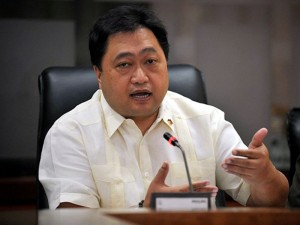Finance chief open to income tax cuts
Finance department officials are open to amending the country’s current income tax structure to bring rates and brackets in line with regional norms, but support would be contingent on the passage of other measures to raise revenues.
Speaking at the Senate Tuesday, Finance Secretary Cesar V. Purisima said what was vital was that the government’s spending program for infrastructure and social services remained funded.
“Once we pass the other measures, we’d be open to review this,” said Purisima, head of the Cabinet’s economic cluster. “We can’t tweak just one part. We should run models to see the effects,” he said.
Calls to amend the current income tax regime, which has defined top earners as individuals earning P500,000 a year, has snowballed in recent weeks.
The Tax Management Association of the Philippines (TMAP) said income taxes in the Philippines were the highest in the region. The World Bank likewise said the government should consider lowering income taxes to make Filipino workers more competitive in Southeast Asia.
For ordinary employees, TMAP said the country’s top earners should be taxed 30 percent—at most—of their gross incomes. TMAP said a tax rate somewhere between 20 and 30 percent would be appropriate and would be more in line with regional standards.
This change should be done, the industry group said, “in order to make the Philippine workforce more competitive with its (Southeast Asian) neighbors.”
Under existing laws, ordinary employees are taxed progressively according to their salaries. Those earning at least P500,000 a year—the prevailing threshold for the top tax bracket—are taxed at 32 percent. This is significantly higher than Malaysia’s 11 percent, Thailand’s 10 percent, Vietnam’s 20 percent and Singapore’s 2 percent.
Among the measures Purisima wanted passed before touching income taxes included the rationalization of fiscal incentives for corporations and the fiscal responsibility bill, which mandates that lawmakers identify funding sources for legislation that requires fresh outlays for incentives.
Purisima said the Department of Finance (DOF) and the Department of Trade and Industry (DTI), which grants incentives to companies, have reached an agreement on a version of the bill that would be passed to Congress this week.
Senate President Franklin Drilon, a member of the Senate committee on finance, assured Purisima that amendments to income taxes would not be passed without parallel revenue-raising measures.

